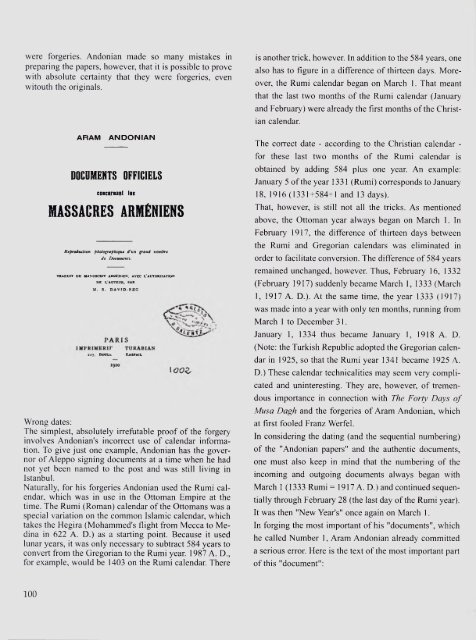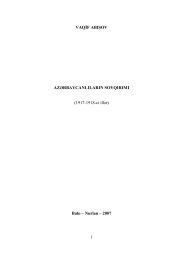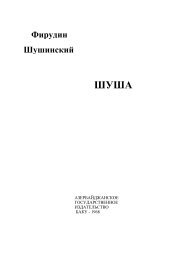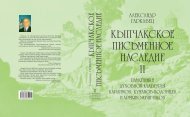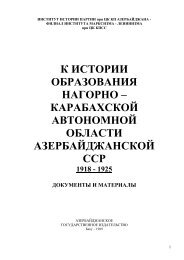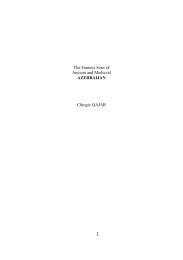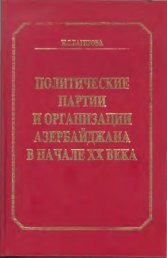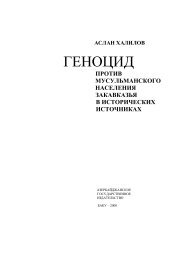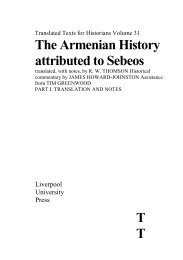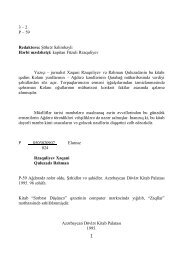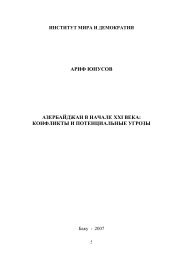ARMENIAN - Erevangala500
ARMENIAN - Erevangala500
ARMENIAN - Erevangala500
Create successful ePaper yourself
Turn your PDF publications into a flip-book with our unique Google optimized e-Paper software.
were forgeries. Andonian made so many mistakes in<br />
preparing the papers, however, that it is possible to prove<br />
with absolute certainty that they were forgeries, even<br />
witouth the originals.<br />
ARAM ANDONIAN<br />
DOCUMENTS OFFICIELS<br />
concernant les<br />
MASSACRES ARMENIENS<br />
Reproduction photographique d un grand nomkre<br />
de Documenti.<br />
TRADUIT DO MANUSCSIT ARM/.NIKN, AVEC I.'AUTORISATION<br />
DE l/AUTEUR, IAR<br />
M . S . D A V ID R E G<br />
227 . BOOLh RASTAIZ.<br />
Wrong dates:<br />
The simplest, absolutely irrefutable proof o f the forgery<br />
involves Andonian's incorrect use o f calendar information.<br />
To give just one example, Andonian has the governor<br />
o f Aleppo signing documents at a time when he had<br />
not yet been named to the post and was still living in<br />
Istanbul.<br />
Naturally, for his forgeries Andonian used the Rumi calendar,<br />
which was in use in the Ottoman Empire at the<br />
time. The Rumi (Roman) calendar o f the Ottomans was a<br />
special variation on the common Islamic calendar, which<br />
takes the Hegira (Mohammed's flight from M ecca to M edina<br />
in 622 A. D.) as a starting point. Because it used<br />
lunar years, it was only necessary to subtract 584 years to<br />
convert from the Gregorian to the Rumi year. 1987 A. D.,<br />
for example, would be 1403 on the Rumi calendar. There<br />
100<br />
is another trick, however. In addition to the 584 years, one<br />
also has to figure in a difference o f thirteen days. More<br />
over, the Rumi calendar began on March 1. That meant<br />
that the last two months o f the Rumi calendar (January<br />
and February) were already the first months o f the Christ<br />
ian calendar.<br />
The correct date - according to the Christian calendar -<br />
for these last two months o f the Rumi calendar is<br />
obtained by adding 584 plus one year. An example:<br />
January 5 o f the year 1331 (Rumi) corresponds to January<br />
18, 1916 (1331+584+1 and 13 days).<br />
That, however, is still not all the tricks. As mentioned<br />
above, the Ottoman year always began on March 1. In<br />
February 1917, the difference o f thirteen days between<br />
the Rumi and Gregorian calendars was eliminated in<br />
order to facilitate conversion. The difference o f 584 years<br />
remained unchanged, however. Thus, February 16, 1332<br />
(February 1917) suddenly became March 1, 1333 (March<br />
1, 1917 A. D.). At the same time, the year 1333 (1917)<br />
was made into a year with only ten months, running from<br />
March 1 to December 31.<br />
January 1, 1334 thus became January 1, 1918 A. D.<br />
(Note: the Turkish Republic adopted the Gregorian calen<br />
dar in 1925, so that the Rumi year 1341 became 1925 A.<br />
D.) These calendar technicalities may seem very compli<br />
cated and uninteresting. They are, however, o f tremen<br />
dous importance in connection with The Forty Days o f<br />
Musa Dagh and the forgeries o f Aram Andonian, which<br />
at first fooled Franz Werfel.<br />
In considering the dating (and the sequential numbering)<br />
o f the "Andonian papers" and the authentic documents,<br />
one must also keep in mind that the numbering o f the<br />
incoming and outgoing documents always began with<br />
March 1 (1333 Rumi = 1917 A. D.) and continued sequen<br />
tially through February 28 (the last day o f the Rumi year).<br />
It was then "New Year's" once again on March 1.<br />
In forging the most important o f his "documents", which<br />
he called Number 1, Aram Andonian already committed<br />
a serious error. Here is the text o f the most important part<br />
o f this "document":


